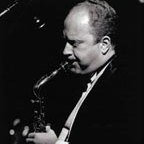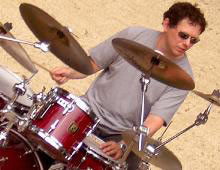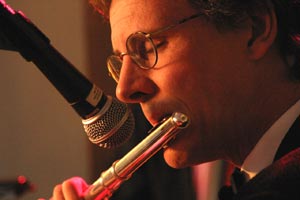

Jazz has always 'played' a central role in Angus’ life. And it was his love of swing jazz that led him to launch his big band. Recently voted one of the top five British jazz bands by readers of The Week magazine, tracks from The Big Band’s debut album 'Now I Know Why' and the follow-up album, 'It’s a Swing Thing', have been featured on television and radio on both sides of the Atlantic.
The sixteen top-flight musicians – whose unique sound is comprised of saxophones, trumpets, trombones, bass, guitar, drums and piano – play annually at the Chelsea Flower Show. This year, the band has performed for several top companies including British Airways, Price Waterhouse Coopers and Waitrose.
An accomplished songwriter, pianist and vocalist, Angus – an Associate of the Royal College of Music – is also a highly regarded jazz educator.

Paul Deegan: If you could have dinner with three other contemporary musicians or composers, who would they be?
Angus Murray: I would choose Diana Krall, Wynton Marsalis and Jay Kay. I love singer Diana Krall’s voice and the way she plays with the phrases of a tune. Trumpeter Wynton Marsalis is a great ambassador for both jazz and classical music: as well as being Artistic Director for the Lincoln Centre Jazz Programme in New York, he is under contract to Sony as a classical artist. I would invite singer Jay Kay (from the band ‘Jamiroquai’) because I respect his originality and innovation.
PD: If you weren't able to be a paid musician, what job would you like to have?
PM: Something similar to what I’m doing at the moment. About a year ago my wife, Yvonne, and I left London to live and work in mid-Wales for the churches there, as worship musicians and tutors. Funnily enough, this hasn’t got in the way of being a ‘paid’ musician very much at all. The only problem I now have is trying to find the time to be creative and write/arrange music, as we now have a 17th century house to renovate and live in and a five month old daughter thrown in for good measure!


Paul Deegan: You’re embarking on a Master’s Degree in Music Psychology: what got you interested in this side of music and what will the Master’s involve?
Mark: This is a two year part time course at University of Sheffield. It is an attempt on my part to look more formally at the processes that go in within performance, and I hope this will be of use to both my teaching and playing.
PD: What section process did you go through to become a national jazz finalist?
FS: The band recorded a demo at Mike Perry's, which got us through to the semi-finals. The semi final was a live concert with three judges and we were selected to represent the South of England.
